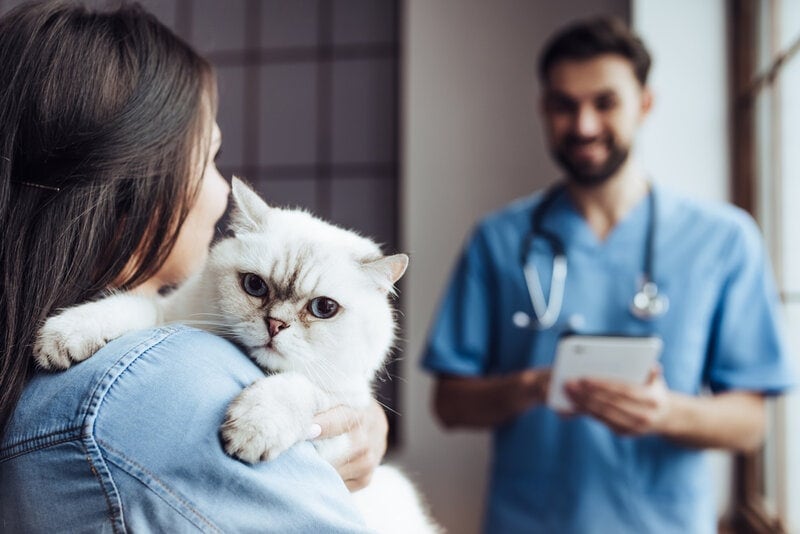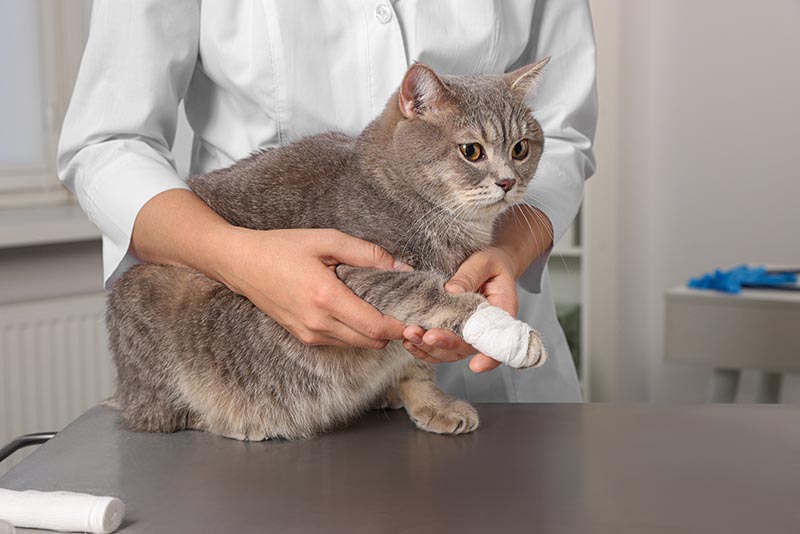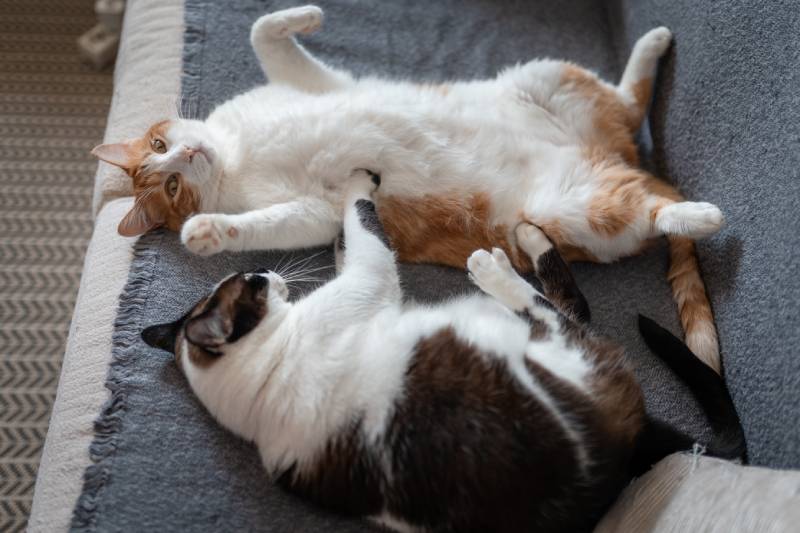How to Switch a Cat’s Food Easily: Vet-Reviewed Step-by-Step Guide & Tips

By Misty Layne
Updated on
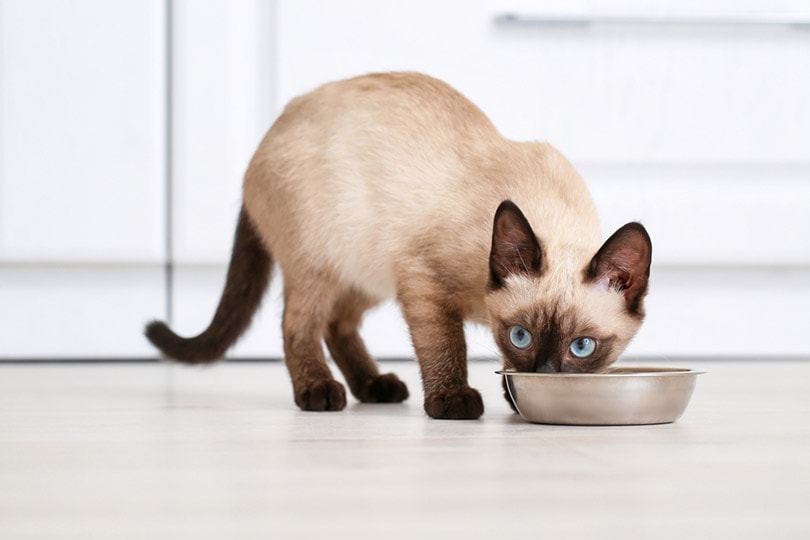
Click to Skip Ahead
Throughout your cat’s lifetime, you’ll need to switch out the kind of food they eat a few times. Whether it’s because your feline is a picky eater or your kitten needs to start eating adult cat food, occasions arise where you just can’t keep feeding them the food they’ve been eating. But you also can’t just give your cat a new brand of food.
Quickly changing out foods raises the risk of your kitty getting a very upset stomach, leading to diarrhea and vomiting, which isn’t a situation either of you wants to deal with. Instead, you need to take some time to switch out your pet’s food. Ready to learn how to switch out your cat’s food easily?
The 4 Reasons to Switch Out a Cat’s Food
There are several reasons that you’ll have to change your cat’s food during their lifetime.
- Health: If your kitty friend is dealing with health concerns, such as food allergies or sensitive skin, switching them to a different food is the only way to improve the situation.
- Age: As your cat matures, you’ll need to change their food to meet their nutritional needs. Kittens can’t continue eating kitten food their whole life, so around the age of 1, they’ll need to be switched to adult cat food. When your feline reaches their senior years, a switch to a senior-specific cat food may aid in keeping their joints and immune system healthy.
- Weight concerns: Felines are food motivated, so it comes as no surprise that they can end up eating more than they should and pack on a few extra pounds. Sometimes the remedy for this can be as simple as just feeding the cat a bit less of their current food. However, switching your pet to a weight-control cat food may be beneficial.
- Healthy habits: To keep cats from becoming picky eaters, they need to get used to consuming a variety of foods in a rotation. This is easier said than done because cats are creatures of habit. But the more foods cats learn to accept, the wider the scope of the nutrition they will receive and the easier your life will be.
- Outdoor or indoor: Where your cat spends their time can determine the type of food that they need. If you encourage an outdoor kitty to stay inside full time, it’s advisable to switch to indoor cat food, as indoor pets are less active than those living outdoors (and more likely to develop hairballs, which an indoor formula can help prevent).
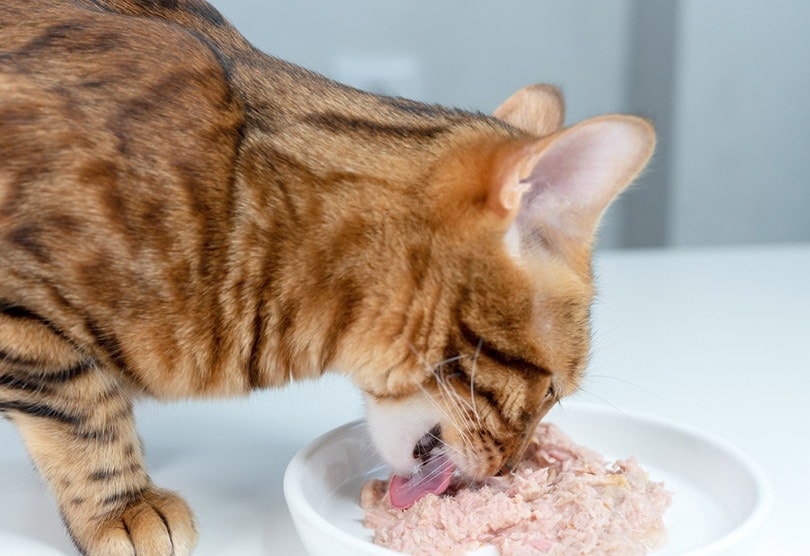
The 4 Steps for Switching a Cat’s Food Easily
As we said above, switching your cat’s food shouldn’t be done quickly; the process will take roughly 7–10 days, but following the below steps should enable you to avoid stomach issues.
- Step 1: For the first couple of days, mix 75% of the old food with 25% of the new food.
- Step 2: For the next 2 days, serve 50% of the old food with 50% of the new food.
- Step 3: For the final 2 days, mix 75% of the new food with 25% of the old food.
- Step 4: Finally, serve only the new food.
Yes, it really is that simple! The trick is to switch things out gradually, so the kitty can slowly get used to the new food.
Tips for Switching Out Food for a Picky Feline
Felines are known for being finicky, so occasionally, you’ll realize you have a picky kitty on your hands—one displeased with their food change and refusing to eat. Don’t worry, though; there are ways to entice your cat into eating the new food.
- Feed your pet the old food on a schedule rather than free feeding them. Put out meals only three times a day, and remove any food that’s not been eaten after a half hour. Once your cat is used to this schedule, you can try the slow transition again.
- Add a bit of wet food to your pet’s dry food (or vice versa).
- Toss a few pieces of boiled, shredded plain chicken into your cat’s food.
- Add cat-safe bone broth to the food.
Eventually, your picky eater should come to enjoy (and maybe even love) the new food!
While providing our feline companions with high-quality food is paramount, selecting the right food and water bowl is equally important. The modern yet practical design of our Hepper NomNom Cat Bowl combines cat-catered features, like whisker-friendly shallow dishes and slight elevation, with a contemporary style aimed at protecting your floors from messy eating and drinking. The NomNom is entirely dishwasher safe and was thoughtfully created with your cat’s health and well-being in mind.
Make sure you’re feeding your cat the right amount of food and the correct type for their lifestyle, check out our cat food calculator here.
The exact amount of calories an individual animal needs to maintain a healthy weight is variable and influenced by many factors including genetics, age, breed, and activity level. This tool is meant to be used only as a guideline for healthy individuals and does not substitute veterinary advice
Final Thoughts
Switching your cat’s food is easy, but it will take some time. Simply changing one food for another overnight can often result in an upset stomach, so instead, switch out food slowly over a week or so. By the end, your cat should have no trouble eating the new food.
However, if your kitty is a picky eater, you might have to work a little harder to entice them into eating the new food. This could include pouring a bit of cat-safe bone broth into the food or adding a few pieces of boiled, shredded plain chicken to it. Over time, picky eaters should learn to love the new food!
Featured Image Credit: Pixel-Shot, Shutterstock




